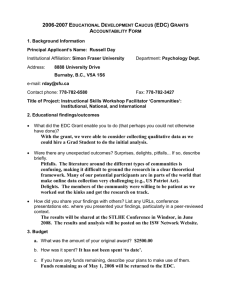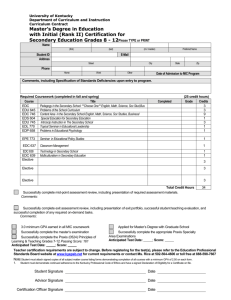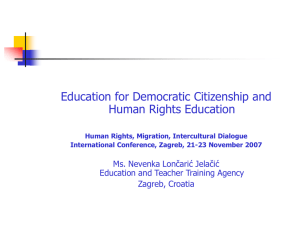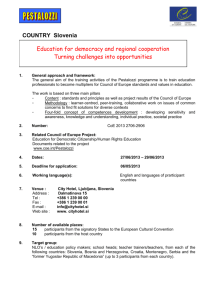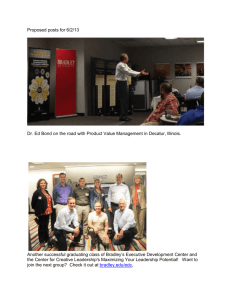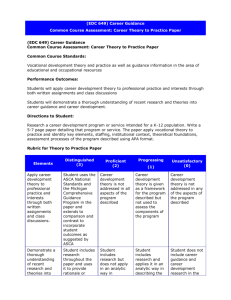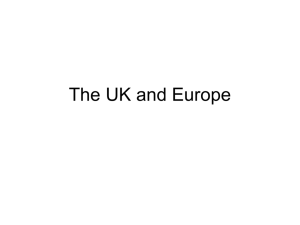CONCEPT PAPER EUROPEAN YEAR OF CITIZENSHIP THROUGH EDUCATION
advertisement
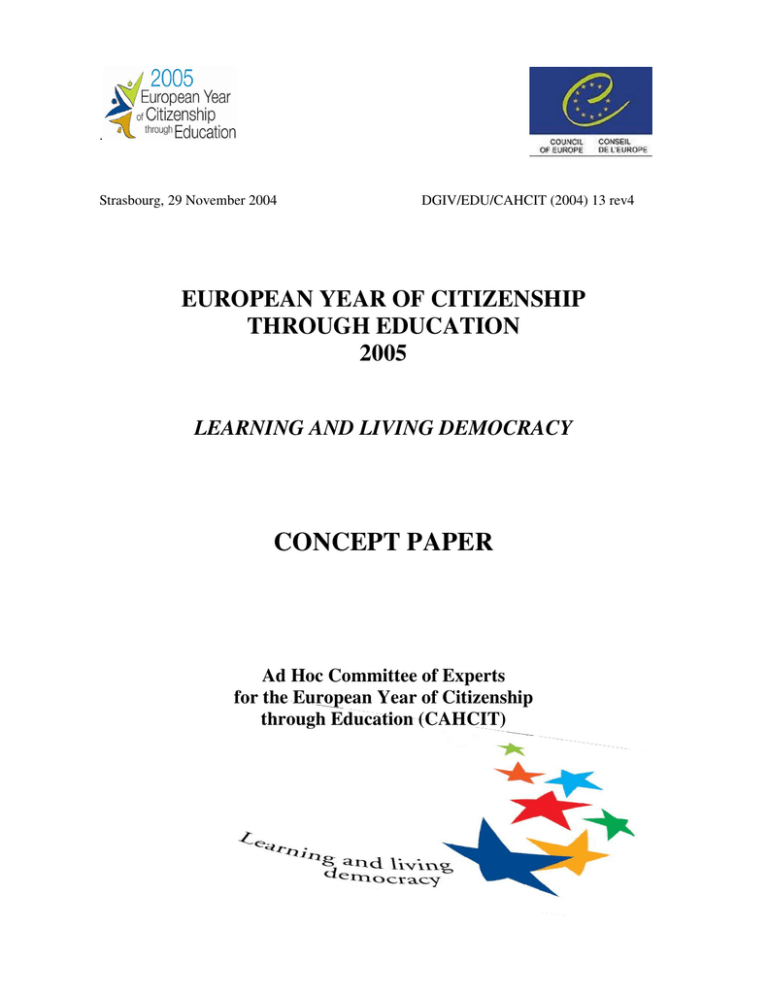
. Strasbourg, 29 November 2004 DGIV/EDU/CAHCIT (2004) 13 rev4 EUROPEAN YEAR OF CITIZENSHIP THROUGH EDUCATION 2005 LEARNING AND LIVING DEMOCRACY CONCEPT PAPER Ad Hoc Committee of Experts for the European Year of Citizenship through Education (CAHCIT) 2005 – The European Year of Citizenship through Education “Learning and living democracy” The Council of Europe has proclaimed the year 2005 European Year of Citizenship through Education (hereinafter referred to as the “Year”). It wishes to draw attention to how crucial education, both formal and non-formal, in a life-long learning perspective, is to the development of active citizenship and in fostering democratic culture. The “Year” aims at making people aware of the fact that citizenship is not only a legal and political concept, but an all-embracing one. On the one hand, citizenship implies that all citizens, women and men alike, should have full enjoyment of human rights and feel that they are protected by the democratic society. On the other hand, citizenship also implies that everyone needs to get involved in matters that concern life in society and to act throughout their lives as active and responsible citizens respectful of the rights of others. Education for democratic citizenship (EDC) and human rights education (HRE) can help develop critical thinking and learning to live together. They favour mutual understanding, intercultural dialogue, solidarity, gender equality and harmonious relations within and among peoples. They promote a sense of belonging to and an awareness of the Council of Europe’s values and principles of freedom, political pluralism, human rights and the rule of law. They further the effective domestic implementation by member states of human-rights instruments, especially the European Convention on Human Rights (ECHR). The “Year” is not intended to be a “campaign”, finishing at the end of 2005. It is rather seen as a political framework for actions to be taken at the level of member states, as the beginning of a sustainable process which is expected to continue over the years to come. The “Year” is designed to stimulate a general interest in all these issues, strengthen the commitment of member states to put education for democratic citizenship into practice, provide them with frameworks and tools to help them to do so and encourage the development of initiatives and partnerships. Political background and current context EDC/HRE has been a priority area for the Council of Europe since 1997. The organisation has initiated a wide range of activities and actions to support the development of EDC and HRE within and among member states1. Two major action plans provide the political reference for the Council of Europe’s work in this field: the Declaration and programme on education for democratic citizenship, based on the rights and responsibilities of citizens (adopted by the Committee of Ministers in Budapest on 7 May 1999); the Resolution on results and conclusions of the completed projects in the 1997-2000 medium-term programme, adopted by the European Ministers of Education at their 20th Session of the Standing Conference (Cracow, 15-17 October 2000). 1. http://www.coe.int/T/E/Cultural_Co-operation/education/E.D.C/ 3 These two texts have been followed up by the Recommendation Rec (2002) 12 of the Committee of Ministers to member states on education for democratic citizenship, which sets out comprehensive general guidelines for the objectives, contents and methods of education for democratic citizenship policies and reforms. It states, among other things: that education for democratic citizenship, in its broadest possible sense, should be at the heart of the reform and implementation of educational policies; that education for democratic citizenship is a factor for innovation in terms of organising and managing overall education systems, as well as curricula and teaching methods. Council of Europe ministerial conferences have given strong political support to education for democratic citizenship and human rights: the 6th Conference of European Ministers responsible for Youth (Thessaloniki, 7-9 November 2002); the European Ministerial Conference on Human Rights, held to commemorate the 50th anniversary of the European Convention on Human Rights (Rome, 3-4 November 2000). Recently, the 21st session of the Standing Conference of the European Ministers of Education (Athens, 10-12 November 2003) gave a clear message as to the role of education in the new context of the Council of Europe. The main priorities set for the future by the Athens Conference are: managing diversity, intercultural education and quality education. The message from Athens is, in a nutshell, that all educational activities – and this includes EDC and HRE – must take into account the cultural and social diversity of European learners, encourage intercultural learning and social inclusion while providing quality education to all. This message should apply to all activities in the framework of the “Year”. The 2005 European Year of Citizenship through Education will take place in the context of two major events: - the 50th anniversary of the European Cultural Convention (December 2004-May 2005); the Third Council of Europe Summit of Heads of state and government, which will be held in Warsaw on 16-17 May 2005 at the invitation of the Polish authorities. Some activities of the “Year” will be closely linked to these two events. This will stimulate the general interest for democracy learning in the new European context. Objectives The general objective of the “Year” is to bridge policy and practice by empowering policy makers and practitioners at all levels to set up and develop sustainable programmes for EDC/HRE. In this framework, the “Year” has four specific objectives: 4 to raise awareness of how education, both formal and non-formal, can contribute to the development of democratic citizenship and participation, which promotes social cohesion, intercultural understanding and respect for diversity and human rights; to strengthen the commitment of member states to make EDC/HRE a priority objective of educational policy making and implement long-lasting reforms at all levels of the education system; to provide member states with a framework and tools to help them to reflect on the role of education in developing and promoting democratic citizenship and human rights with a view to solving concrete societal problems, fostering youth participation and social inclusion; to encourage the development of initiatives and partnerships providing access to best practice and sharing of knowledge, inside the Council of Europe, within and across member states as well as with other global actors and agencies in order to promote EDC and HRE and favour networking. Participants Participants in the European Year of Citizenship through Education will primarily be policy makers and practitioners, but the “Year” will be open to all those concerned by Education for democratic citizenship and human rights education. The “Year” will only be fully effective in implementing policies if it receives strong support from governments and public authorities at all levels (national, regional and local). Decision makers will be expected to propose strategies, set up institutional frameworks, provide human and financial resources and organise concrete actions. The main participating group in this initiative are multipliers and practitioners dealing with education for democratic citizenship and human rights education, especially educational staff and young people having a specific interest in the subject. School and university leaders, head teachers, teachers, trainers, education projects managers, people working in adult education, education administrators and support staff, curriculum and handbook developers will be invited to contribute to and benefit from the “Year”. NGOs working in the field of Education for democratic citizenship and for youth participation will play a crucial role. Key issues The key issues to be given specific attention in the framework of the “Year” are the following: 1) How to bridge policy and practice in EDC and HRE?2 Examples of actions to be taken: - developing EDC/HRE policies and curricula; encouraging the self-development and self-evaluation of educational institutions (schools and universities, adult education centres); 2. Council of Europe, 2004, All-European Study on EDC Policies. 5 supporting innovative practices in the democratic governance of educational institutions particularly in school management, school environment and school climate, including participation in decision making (pupils, students, parents, teachers, community representatives); - introducing measures for quality assurance, monitoring and evaluation of EDC/HRE ; developing more effective and comprehensive teacher training, at both pre-and in-service levels. supporting the inclusion of non-formal education, including NGO experiences, in school, university and adult education. 2) How can democracy learning contribute to solving societal problems and promote social cohesion?3 Examples of actions to be taken: setting up sites of citizenship as centres of democratic development allowing citizens to be directly involved in the decision-making process; favouring innovative approaches, methods and strategies in EDC/HRE aimed at furthering the inclusion of vulnerable social groups; stimulating projects on non-violent conflict solving through dialogue, negotiation, co-operation and consensus-seeking methods as well as confidence-building measures; developing specific EDC/HRE projects for regions having been involved in conflicts or being socially disadvantaged; promoting active equal opportunities policies and gender mainstreaming in educational institutions; - encouraging networking and civic partnerships around EDC/HRE. Working methods The co-ordination of the implementation of the “Year” has been entrusted to a specific Ad Hoc Committee of Experts for the European Year of Citizenship through Education (CAHCIT), whose composition reflects the transversal and holistic approach of the Council of Europe to EDC/HRE. Experts in education, youth work, human-rights protection and social cohesion are members of this Committee. The Secretariat of the Division for Citizenship and Human Rights Education of the Education Directorate of the Council of Europe will assist the CAHCIT in implementing the “Year”. Support structures for member states are presented in Appendix I. The working methods will be based on: identifying and disseminating knowledge and good practice, sharing information, through interacting networks in and among member states; 3. Council of Europe, 2000, Strategies for learning Democratic Citizenship by KH Dürr, Isabel Ferreira Martins and Vedrana Spajic-Vrkas and Education for Democratic Citizenship: a lifelong learning perspective by Cesar Bîrzéa. 6 putting practical/innovative instruments at the disposal of member states to experiment during the “Year” and give feedback on those; establishing ongoing contacts between the Council of Europe Secretariat and those responsible for implementing the “Year” in member states, including on-line contact and through the Council of Europe’s website; - supporting opportunities for partnerships with European and international institutions. Within the Council of Europe, a transversal and multidisciplinary approach has been chosen, developing co-operation with a number of partners: the Parliamentary Assembly, the Congress of Local and Regional Authorities of the Council of Europe, the General Directorate of Human Rights, the General Directorate of Social Cohesion, the Directorate of Youth and Sport, the Directorate of Culture and Cultural and Natural Heritage and all sectors within the Education Directorate, the North-South Centre in Lisbon and the Council of Europe Information and Documentation Centres in member states. The Council of Europe will organise inter-institutional meetings with major international organisations before and during the “Year” with a view to seeking close co-operation with these, coordinating actions and fostering joint projects, as well as supporting activities already initiated. Expected results The “Year” will bring about visible, tangible and sustainable results, which should follow the main objectives of the “Year”. These results could be translated into products and processes during or after the “Year”. Products: - An improved overview of EDC/HRE initiatives and results at the member-state level through an initial data gathering (via Ministries of Education or Civic Education Centres). Improved access to information on EDC/HRE (translated documents, databanks, dissemination of findings, etc). - The elaboration and implementation during the “Year” of a Council of Europe Action Plan. - The publication of examples of Action Plans (officially approved with clear indications of resources made available) to turn policies into practice, which have been formulated at memberstate level; these will be translated into one of the Council of Europe official languages and made available via the “Year” ’s website. - The development of a new framework for future European co-operation in the field of democracy learning, which will take account of the current debate on the European Cultural Convention and Recommendation 1682 (2004) of the Parliamentary Assembly of the Council of Europe on Education for Europe. - The evaluation and validation by various educational establishments of a set of instruments and tools for formal or non-formal learning; a databank of such tools will be constantly available on-line and in various languages by the end of the “Year”. - The setting up of an on-line and actively functioning network of innovative schools. - A shift in public attitude towards the implementation of EDC/HRE-related policies. 7 - The sharing of feedback on the use of Council of Europe instruments in a specific member state. Processes: - Sustainable awareness raising mechanisms amongst the professional public to promote EDC/HRE are being set up. - Sustainable consultation processes involving both decision makers and stakeholders are being set up. This is particularly important when it comes to issues relevant for democracy learning, e.g. school organisation, accountability of public authorities in the field of education, etc. - Consultation processes in various member states will be given greater attention. Data on such processes are gathered and disseminated: e.g. data on how debates are organised in a specific country; or on the functioning of consultative bodies and their role in EDC/HRE policy implementation. - Data on democratisation processes in education will be made available, e.g. data on the ways of “making one’s voice heard” when it comes to influencing governmental policies in education. - Greater focus will be given to EDC/HRE as a common background for the development of education systems in member states and support will be offered to partnerships which aim at making EDC a sustainable element in the field of education. Evaluation The evaluation of the “Year” is a task devoted to the CAHCIT. It will focus on the results obtained in relation to the four specific objectives of the “Year”. The CAHCIT will take advantage of the possibility stated in its terms of reference to reach for external input wherever it deems necessary, e.g. for developing evaluation criteria. The CAHCIT will be supported by the EDC Secretariat in this task. * * * This document has been prepared by the CAHCIT in order to stimulate discussion during the Launching Conference of the “Year” (Sofia, 13-14 December 2004) and further activities during the European Year of Citizenship through Education. It is not exhaustive in its nature and should serve as a basis for initiatives in the Council of Europe member states. The various contributions/initiatives carried out in the framework of the “Year” will be presented in a report and evaluated at an assessment conference after the “Year” has finished. 8 APPENDIX I SUPPORT STRUCTURES FOR THE “YEAR” IN MEMBER STATES 1. Introduction To give the European Year of Citizenship through Education (2005) the necessary degree of cohesion and impact, the Council of Europe has created an Ad hoc Committee composed of representatives from different sectors of the Council of Europe (CAHCIT). The Committee met on 27-28 April and 21-22 October 2004. Its Bureau met on 28 and 29 June and on 6-7 September 2004 to prepare the launching Conference of the “Year” (Sofia, 13-14 December 2004) and other matters related to the organisation of the “Year” at the Council of Europe level and at the level of member states. The Committee works closely with the network of EDC/HRE coordinators who are expected to be focal points in member states for the implementation of the “Year”. It is expected that different partners will support the work at member state level, e.g. through the formation of coordinating committees or any other similar structures. 2. Possible role of coordinating committees/bodies Although great flexibility and ownership by member states will be key elements during the planning of the “Year”, some ideas might be useful when identifying the objectives for the activities in the member states: promoting the aims of the “Year” in the country by informing the stakeholders and, when appropriate, the general public about the initiative and soliciting wide-spread support; identifying needs and expectations at the member state level with regard to the “Year”, monitoring its impact, evaluating its achievements according to guidelines/criteria established by the CAHCIT and developing follow-up activities; motivating and assisting in a practical way all public bodies, foundations, companies, non-governmental organisations and individuals who are willing to contribute to the “Year”; - coordinating the activities so that a coherent programme is developed and implemented; presenting countries’ activities and experiences at the European level, notably through the “Year”’s website. This could give inspiration to other member states who could make good use of the information provided and examples of good practice. 3. Formation of coordinating committees Coordinating committees/bodies should be formed as soon as possible. The Ministers of Education have received a personal letter from the Secretary General of the Council of Europe asking them to support the EDC coordinators as well as the activities to be organised in the member states, and encouraging them to set up preparatory committees/bodies. The composition of the committees should preferably reflect the holistic approach to the “Year”. Representatives of the following target groups might be considered: policy makers, civil servants, headmasters/head teachers, teachers, trainers, students, pupils, media representatives, parent 9 associations, NGO representatives, in particular NGOs involved with youth. It is important that practioners be associated since the main objective of the “Year” is to bridge policy and practice. Coordinating committees might find it useful to associate the member state representation of the European Commission and UNESCO, since both have projects on citizenship education. The European Commission has invited the EDC/HRE coordinators to make active use of its different funding programmes. 4. Tasks of coordinating committees The priorities and scope of member state programmes are decided upon by each individual committee, taking into account the objectives and concept of the “Year” as agreed upon by the Council of Europe member states. However, in order to ensure an effective implementation of the “Year”, the committees are invited to deal with the following issues as soon as possible: - general orientation and political priorities of the member state programme; - setting up a plan of activities; - co-ordination of key events to ensure a maximum impact on relevant target groups; - co-ordination of information and media campaigns, including setting up of links to the “Year” ’s website. When useful, translation of material produced by the Council of Europe (introduction to the EDC pack4, brochure, poster, key publications); - evaluation according to criteria established by the CAHCIT, reporting and for follow-up activities at member state level. preparation 5. Proposed elements in member states action programmes As mentioned before, those elements should deal with initiatives to be developed by the coordinating committees themselves but also include contributions to activities at European level. Some activities might be carried out at bilateral level with the assistance of the Council of Europe. The implementation of the Council of Europe Recommendation Rec (2002) 12 of the Committee of Ministers to member states on education for democratic citizenship should be kept in mind throughout the “Year” and thus be referred to as the framework of implementation. Suggested actions could include events and activities such as: - organising debates with different stakeholders on how to implement adopted policies (policy makers, headmasters, teachers, NGO representatives); - monitoring the use of the instruments prepared by the Council of Europe, and working with pilot schools for testing these instruments, with a view to validating them and giving feed-back to the Council of Europe; - translating of material/instruments on EDC/HRE into languages of member states; 4. See Appendix III. 10 - organising training seminars on EDC/HRE for teacher trainers in all subjects and for other multipliers; - contributing to the Council of Europe programme on teacher training; - organising debates and media campaigns on issues related to participative citizenship and human rights education; - setting up quiz, competitions on Internet that could attract young people; - developing questionnaires/interviews on issues that reveal what the general public knows about necessary competencies of citizens and about human rights; - asking for presentation of examples of good practice related to active citizenship that could be shared through the “Year” ’s website; - developing specific projects aimed at favouring the participation of migrants and ethnic minorities, in particular children and young people; - developing pilot projects on youth participation in underprivileged areas (e.g. with high unemployment or rural areas) and projects with disabled young people that could motivate local politicians to take an interest in the project and in the “Year”. 6. Monitoring Process The CAHCIT and the Council of Europe Secretariat will be in contact with coordinating committees/coordinators when necessary for advice and will provide them with material for use and adaptation in member states, such as: - a brochure on the EDC Project (1997-2004); a brochure on the “Year” that sets out the objectives, target groups; information about the EDC pack; a poster (that can be adapted to the member state level); the EDC logo as well as the specially designed photograph for the “Year” and guidelines on how to use it; regular press releases (basic information to be adapted to the situation in the country); regular updating of the “Year” ’s website; instruments for policy development, teacher training and democratic school governance; other instruments/information kits; material/expertise for certain activities organised in member states (such as providing experts or trainers and putting documents at disposal). 7. Support documents The Council of Europe has a wealth of instruments and documents on human rights and education for democratic citizenship, which can be put at the disposal of participants or downloaded from the Council of Europe website (www.coe.int). The “Year”’s website will contain bibliographies and establish links to other websites useful to this effect. 11 8. Evaluation at the member state level Evaluation at the member state level will be performed by the coordinating committees/EDC coordinators on the basis of the criteria developed by the CAHCIT. The EDC Secretariat will be responsible for the synthesis of these evaluations. 12 APPENDIX II USE OF THE LOGO The current EDC logo will serve as the logo for the “Year”. In addition, a specially designed photograph will be applied in the context of the publications of the “Year” as well as on posters and leaflets. The copyright of both lies with the Council of Europe. Use of the EDC logo and the specially designed photograph is subject to the following conditions. Variations Coordinating committees may choose to produce a variation of the slogan “Learning and living democracy” in languages of member states. Any variation must retain the core graphic design. References to the country may be added. Other variations of the logo, specifically those developed or used by other bodies than coordinating committees, are not accepted. Use of the logo Subject to the conditions set out below, the logo may be used for - information and promotional activities; fund-raising activities; commercial activities; which are intended to further the objectives of the “Year”. Information purposes Permission to use the logo broadly and flexibly for information and promotional activities without fund-raising or commercial purposes is granted by the coordinating committee concerned. The committees may choose to lay down general rules for the use of the logo in the context of information and promotional activities. Where no coordinating committee exists, permission is granted by the EDC coordinator in consultation with her or his Ministry. Fund-raising activities Use of the logo may be granted for activities intended at raising funds for the implementation of the programme of the “Year”. Fund-raising activities can only be undertaken by non-commercial, non-profit making bodies. Permission to use the logo for fund-raising activities without commercial purposes may be granted by the coordinating committee concerned. 13 Where no coordinating committee exists, permission may be granted by the EDC coordinator in consultation with her or his Ministry. Commercial purposes Use of the logo may be granted for commercial activities, as well as any use intended to lead to commercial or personal profit, if these activities are also promoting the aims and the programme of the “Year”. Permission to use the logo for commercial purposes may be granted by the coordinating committee concerned. Commercial use of the logo must be authorised in writing. Where no coordinating committee exists, permission may be granted by the EDC coordinator in consultation with her or his Ministry. Liability All instances authorised to use the logo must acknowledge that: the activities for which the logo is used are carried out in accordance with the objectives of the “Year”; - the Council of Europe is not responsible for the activity of any such instance. In the case of commercial activities, this acknowledgement must be given in writing. 14 APPENDIX III COUNCIL OF EUROPE INSTRUMENTS DIRECTLY RELATED TO EDC/HRE The CAHCIT wishes to point out that the list of documents which follows is nor final neither exclusive. The following instruments have been chosen because they address practical issues directly related to EDC/HRE. They have been prepared according to needs expressed by practitioners and, as far as the EDC Pack is concerned, in accordance with the third specific objective of the “Year”. Member states are encouraged to use them as reference instruments and create their own instruments on basis of these. Instruments prepared for the “Year” 1. The EDC Pack The EDC Pack is a collection of practical instruments specifically designed to provide support to all those involved in education. It has four main goals: • To raise awareness of EDC and encourage reflection on the role of education in promoting EDC and HRE; • To communicate coherent EDC policies, strategies and approaches that are based on current actions and practices; • To stimulate discussion, debate and action on new methods and directions for EDC and HRE policies and practices, including the democratic governance of educational institutions; • To build capacity for EDC by providing an instrument that supports the development of effective EDC policies and practices at all levels and sectors of the education system. The EDC Pack has been prepared as a follow-up to the Council of Europe’s All-European Study on EDC Policy Making which found that there is a significant ‘compliance gap’ in member states between EDC policy making and actual practices. The EDC Pack provides documents, strategies and approaches that are intended to help bridge policy and practice. The EDC Pack is a coherent instrument that is made up of a series of tools and documents, which address the development and implementation of policy and practice for EDC and HRE across all education sectors. It consists of: Introduction to the EDC Pack Target audience: all those involved in EDC and HRE at all levels of education Introduction for each member state: sets the EDC Pack within the context of each member state Council of Europe Introduction: sets the EDC Pack within the context of the activities and outcomes of the Council of Europe’s EDC Project Part 1 – Introduction to EDC: concepts and definitions, glossary of EDC terms and details of EDC coordinators network Part 2 – Current State of EDC Policy and Practice: the outcomes of the Council of Europe’s All-European Study on EDC Policy Making 15 Tool on Key issues for EDC Policies (Tool 1) Target audience: policy makers at all levels A compact checklist of key EDC issues and questions to help policy makers develop effective EDC and HRE policies and bridge policy and practice. The checklist is based on the outcomes of the AllEuropean Study on EDC Policy Making. Tool on Democratic Governance in Education (Tool 2) Target audience: policy makers at all levels, education leaders and administrators, school leaders and principals, student organisations and councils, parent and community organisations Part 1 – Action Paper: instrument for the implementation of democratic governance in education Part 2 – Background Documents: selected articles/publications and examples of good practice Tool on Teacher Training for EDC and HRE (Tool 3) Target audience: teacher trainers, teachers, school leaders and principals, curriculum coordinators, NGOs and community organisations Part 1 – Action Paper: guidelines for the implementation of effective teacher training policies and practices for EDC Part 2 – Support Materials: compendium of support materials for teacher training Tool on Quality Assurance and Self-Evaluation in EDC (Tool 4) Target audience: school leaders and principals, curriculum coordinators, teachers, teacher trainers and education leaders and administrators. This tool is based on the outcomes of the Quality Assurance and School Development Project run by the Centre for Education Policy Studies (CEPS) in collaboration with UNESCO and the Council of Europe. The EDC Pack is designed to encourage flexible use with a wide variety of audiences across a broad range of education sectors and contexts. It can be used as • A whole – given the coherence of the tools and documents; • Separate tools and documents with particular audiences; • In combination with other EDC and HRE documents and resources that exist at national, regional and global levels; • Through a mixture of these approaches. 2. COMPASS manual on Human Rights Education COMPASS has been produced within the framework of the Human Rights Education Youth Programme of the Directorate of Youth and Sport of the Council of Europe. The programme aims to put human rights at the centre of youth work and thereby to contribute to the bringing of human rights education into the mainstream. The COMPASS manual was designed to be as complete and comprehensive in the contents as possible, characterised by the following: • • users don’t have to read in its entirety to be able to use it – a facilitator should be able to run an activity without having to read material that is not directly relevant to their context or situation; contains a minimum of supplementary information for those facilitators who may feel uncomfortable when dealing with a certain theme (COMPASS should be sufficient); 16 • • • • • is eminently practical and based on experiential activities; is attractive, reflects the concerns of young people in Europe and is a tool to develop their social skills and attitudes as much as their knowledge and competencies; focuses on values and on social issues rather than (just) on formal rights as laid down in conventions; is usable in formal and non-formal education; leaves "background information in the background" and not at the beginning so that users can get on with the activities but know that supporting information is available for reference. As a result, COMPASS is organised in the following way: Chapter I: Familiarises the reader with what is meant by human rights education. It should motivate, inspire and introduce the reader on how to get the best out of COMPASS and its educational approaches, Chapter 2: A collection of 49 activities of different levels of complexity, which cover different themes and address different types of rights, Chapter 3: "Taking action", contains ideas and tips for those that would like to be more active in promoting human rights, Chapter 4: Provides essential information about human rights and international standards and documents, Chapter 5: Supplementary background information about the themes, The appendixes: Contain essential information on legal documents, because human rights are also about laws. 3. T-Kits produced by the Youth Directorate The training kits are thematic publications written by experienced youth trainers and other experts. They are easy-to-use handbooks for use in training and study sessions. T-Kits are produced in English, French and German. Translations into other languages are encouraged and often funded through the network of National Agencies of the YOUTH programme of the European Union. The following T-Kits are most relevant to education for democratic citizenship (concepts, learning methods and the practice of EDC): T-Kit 4 – Intercultural Learning T-Kit 6 – Training Essentials T-Kit 7 – Under Construction: Citizenship, Youth and Europe T-Kit 8 – Social Inclusion 4. European Charter for Democratic Schools without Violence Upon the initiative of the Council of Europe, young people from across Europe have prepared the European Charter for Democratic Schools without Violence on the basis of the fundamental values and principles shared by all Europeans, in particular those set forth in the Council of Europe’s Convention for the Protection of Human Rights and Fundamental Freedoms. More than 120 schools throughout Europe expressed an interest in the project. A panel of Council of Europe and educational experts selected the 26 best contributions sent in by schools from 19 European countries. The selected schools were invited to send delegates to a project conference held from 14-18 July 2004. More than 50 student delegates gathered at the European Youth Centre at Strasbourg to draft and adopt the Charter. This group of young people recommends that schools throughout Europe seriously consider using this Charter as a model with which to further the cause of democratic schooling without violence. The participants translated the Charter into their native 17 languages. It is anticipated that up to 30 000 school children from across Europe will vote on the final version of the Charter. Bearing in mind the differences in Europe’s education systems, the Charter can be either adopted as it stands, or it can be adapted and further strengthened by the various school communities, while preserving its spirit and general principles. 5. Website A specific website for the “Year” is under development. It will include information about events, publications and have links to websites in member states, institutions and NGOs. How can the instruments be used? The EDC Pack and the other Council of Europe instruments can be used: • • • • • • • • • • • • • • • As resources which can be translated and distributed in languages of member states To stimulate the contribution of all education sectors to EDC and HRE actions and activities To develop codes of practice for EDC and HRE To create websites, resource centres and databases for EDC and HRE With pilot institutions from all education sectors, including schools, as ‘sites of citizenship’ whose outcomes can be monitored, evaluated and disseminated At launch events, dissemination events, conferences and workshops At teacher training and other seminars that promote EDC and HRE To build networks which involve and encourage contributions from a range of partners and institutions Through the development and promotion of regional and European networks in EDC and HRE With a network of pilot institutions from education sectors across member states Through the Council of Europe’s network of EDC coordinators Through contributions to the Council of Europe’s website and database for EDC and HRE In partnership with global actors and agencies To strengthen the interrelationship between national, regional, European and global dimensions through networks and intersectorial co-operation At conferences, events, workshops, seminars and dissemination events that bring together actors from all levels (local, national, regional, and global) who have an interest in EDC and HRE 18
